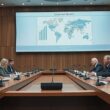Green Party Chief Felix Banaszak clearly stands behind the demand of Chancellor candidate Robert Habeck for significantly more money to be spent on the German military. “We’re taking care of it, so that our security is not a matter of chance” he said to RTL and ntv broadcasters.
However, he did not explicitly commit to defense spending of 3.5% of the country’s economic output, as proposed by Habeck. The Greens had agreed on a draft of the election program with Habeck, which foresees a defense budget of “much more than 2 percent” of the economic output. “The 3.5 percent is, of course, an interpretation of that.”
Banaszak did not explicitly address whether defense spending of 3.5% of GDP was a consensus within the party, as Habeck had said. “It is not the Greens’ wish, and probably not that of most people in this country, to have to spend a lot of money on the military” he said.
The world, however, is not the one we would like it to be, he said, citing the Russian invasion of Ukraine and the election of Donald Trump as US President. “Do we still want to rely on the hope that others will take care of things for us?”
The Green Party chief criticized his opponents, Scholz and Merz, for their stance on defense spending. “I expect from the two of them – not just in this question, but also in others – that they simply be honest with us.”
Scholz should learn from his mistakes in dealing with Russia, Banaszak said, and be honest about the value of security to the country. The problem with Friedrich Merz is that he does not say where the money for his proposals would come from, the Green Party chief added. The party’s proposal is to reform the debt brake and to more heavily tax high net worth individuals, so as not to sacrifice social security for the sake of inner and outer security.
For the Greens, the military aspect of security policy is very central. “We want to be honest with the people and not say we will do the same as before and then everything will be fine” he said, adding that diplomacy and humanitarian aid also play a crucial role in security policy.





